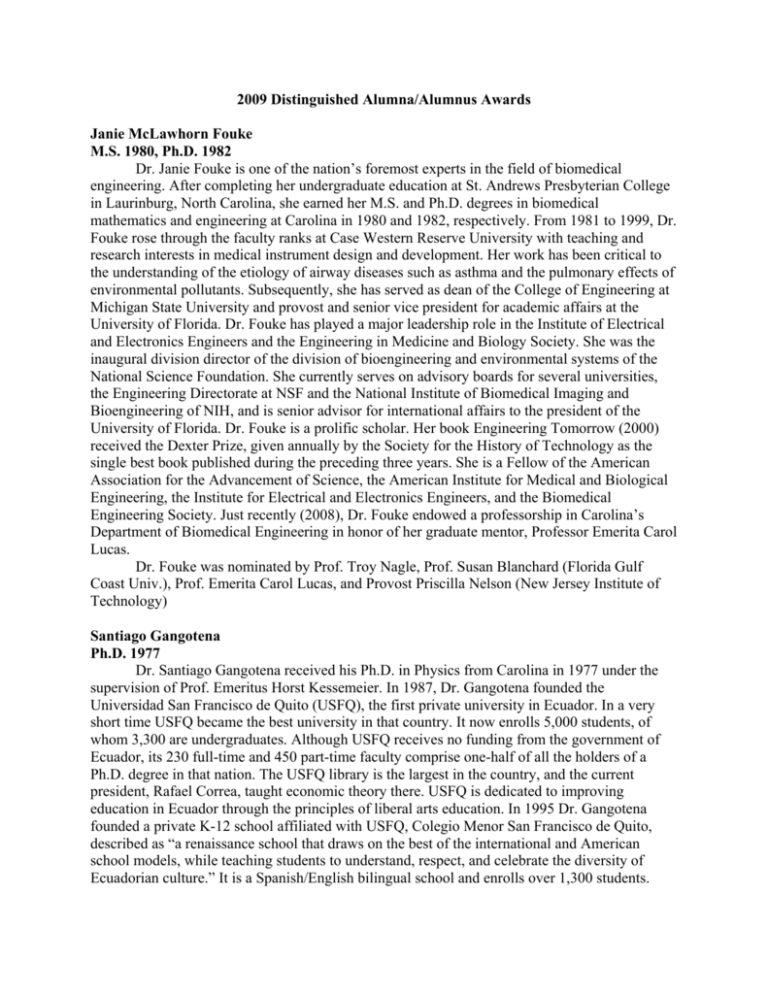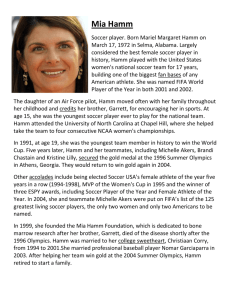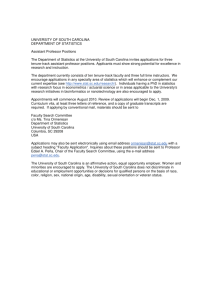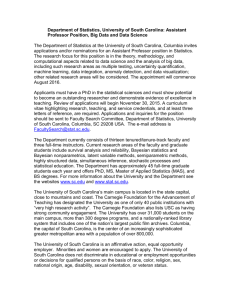2009 - Office of Faculty Governance
advertisement

2009 Distinguished Alumna/Alumnus Awards Janie McLawhorn Fouke M.S. 1980, Ph.D. 1982 Dr. Janie Fouke is one of the nation’s foremost experts in the field of biomedical engineering. After completing her undergraduate education at St. Andrews Presbyterian College in Laurinburg, North Carolina, she earned her M.S. and Ph.D. degrees in biomedical mathematics and engineering at Carolina in 1980 and 1982, respectively. From 1981 to 1999, Dr. Fouke rose through the faculty ranks at Case Western Reserve University with teaching and research interests in medical instrument design and development. Her work has been critical to the understanding of the etiology of airway diseases such as asthma and the pulmonary effects of environmental pollutants. Subsequently, she has served as dean of the College of Engineering at Michigan State University and provost and senior vice president for academic affairs at the University of Florida. Dr. Fouke has played a major leadership role in the Institute of Electrical and Electronics Engineers and the Engineering in Medicine and Biology Society. She was the inaugural division director of the division of bioengineering and environmental systems of the National Science Foundation. She currently serves on advisory boards for several universities, the Engineering Directorate at NSF and the National Institute of Biomedical Imaging and Bioengineering of NIH, and is senior advisor for international affairs to the president of the University of Florida. Dr. Fouke is a prolific scholar. Her book Engineering Tomorrow (2000) received the Dexter Prize, given annually by the Society for the History of Technology as the single best book published during the preceding three years. She is a Fellow of the American Association for the Advancement of Science, the American Institute for Medical and Biological Engineering, the Institute for Electrical and Electronics Engineers, and the Biomedical Engineering Society. Just recently (2008), Dr. Fouke endowed a professorship in Carolina’s Department of Biomedical Engineering in honor of her graduate mentor, Professor Emerita Carol Lucas. Dr. Fouke was nominated by Prof. Troy Nagle, Prof. Susan Blanchard (Florida Gulf Coast Univ.), Prof. Emerita Carol Lucas, and Provost Priscilla Nelson (New Jersey Institute of Technology) Santiago Gangotena Ph.D. 1977 Dr. Santiago Gangotena received his Ph.D. in Physics from Carolina in 1977 under the supervision of Prof. Emeritus Horst Kessemeier. In 1987, Dr. Gangotena founded the Universidad San Francisco de Quito (USFQ), the first private university in Ecuador. In a very short time USFQ became the best university in that country. It now enrolls 5,000 students, of whom 3,300 are undergraduates. Although USFQ receives no funding from the government of Ecuador, its 230 full-time and 450 part-time faculty comprise one-half of all the holders of a Ph.D. degree in that nation. The USFQ library is the largest in the country, and the current president, Rafael Correa, taught economic theory there. USFQ is dedicated to improving education in Ecuador through the principles of liberal arts education. In 1995 Dr. Gangotena founded a private K-12 school affiliated with USFQ, Colegio Menor San Francisco de Quito, described as “a renaissance school that draws on the best of the international and American school models, while teaching students to understand, respect, and celebrate the diversity of Ecuadorian culture.” It is a Spanish/English bilingual school and enrolls over 1,300 students. USFQ enrolls approximately 1,000 foreign students each year. This is among the largest exchange programs in Latin America. Recently, Provost Gray-Little and Vice Chancellor Waldrop visited USFQ to discuss joint research endeavors in the Galapagos Island. Carolina is investing substantial effort in this partnership which has the potential to help preserve one of the world’s most treasured living laboratories, to improve the lives of the people who live there, and to elevate both Carolina’s and USFQ’s reputation in international research. Dr. Gangotena was nominated by Prof. Laurie McNeil, Provost Bernadette Gray-Little, Vice Chancellor Tony Waldrop, Prof. Stephen Walsh, Prof. Emeritus Horst Kessemeier, and Prof. Emeritus Victor Briscoe Mariel Margaret (Mia) Hamm A.B. 1994 Mia Hamm is one of the most famous women athletes in the world, an iconic symbol of women’s sports, and an inspiration and role model to a generation of sports-minded women. Hamm led Carolina to four NCAA championships in women’s soccer. Carolina lost only one game of the 95 in which she played. Hamm was an All-American and ACC Player of the Year for her last three years, and won the ACC Female Athlete of the Year in 1993 and 1994. Playing as a forward for the United States women’s national soccer team, Hamm scored 158 international goals in her career, more than any other player, male or female, in the history of the sport. Hamm retired in 2004 after 17 years of playing soccer with two World Championships and two Olympic gold medals to her credit. In 2007, she was inducted into the National Soccer Hall of Fame, receiving 137 votes of the 141 ballots cast. Hamm is the author of Go For the Goal: A Champion’s Guide to Winning in Soccer and Life (1999) and has appeared in the HBO documentary Dare to Dream: The Story of the U.S. Women’s Soccer Team. In 1999, Hamm began the Hamm Foundation, dedicated to bone marrow research and to help women’s sports programs grow and prosper. In 2001, Hamm established a fund in the Lineberger Comprehensive Cancer Center to help the families of patients during the difficult time following organ transplants. Hamm helped lead Team USA to a gold medal at the 2004 Summer Olympics and was chosen by her fellow U.S. Olympians to carry the American flag at the Athens Closing Ceremonies. Mia Hamm was nominated by Douglas Dibbert on behalf of the General Alumni Association Board of Directors. Walter Edward Hussman Jr. A.B. Jour. 1968 Walter Hussman is a third-generation newspaper publisher and head of WEHCO Media, Inc., of Little Rock, Arkansas, a company that operates nine daily newspapers, 11 weekly newspapers, and 11 cable television companies in five states. Hussman has served as a member of the board of directors of the Associated Press and as chair of the Southern Newspaper Association (SNPA). Under his leadership, SNPA has educated more than 7,200 persons through its Traveling Campus program. Hussman has been honored with the Frank W. Mayborn Leadership Award in recognition of his contributions to SNPA and to journalism. His skillful management of the Arkansas Democrat when locked in a circulation war with the Arkansas Gazette has been called a classic example of how to attract readers by increasing news coverage. Hussman has worked to improve public education in Little Rock, has supported creation of three state-funded charter schools, and has generously supported the Arkansans for Education Reform Foundation. Hussman received his undergraduate degree in Journalism at Carolina in 1968. He has endowed two distinguished professorships and one term professorship in the School of Journalism and Mass Communication, one professorship in the School of Education, and contributed generously to the renovation of Carroll Hall in preparation for its occupation by the School of Journalism and Mass Communication. A Knight Foundation newsletter issued in 2004 called Hussman “a newsman defying conventional thinking by turning out qualify journalism that leads to healthy profitability.” Recently, he urged fellow newspaper publishers to reconsider making their news available for free on the Internet. Instead, he advocates newspaper websites that complement, rather than cannibalize, the print edition. Walter Hussman was nominated by Dean Jean Folkerts. William Frederick Little M.A. 1952; Ph.D. 1954 A native of Hickory, North Carolina, Bill Little received his B.S. degree from LenoirRhyne College before entering Carolina in 1951 as a graduate student selection in the first class of Morehead Scholars. After post-doctoral study in London with Sir Christopher Ingold and a year on the faculty of Reed College in Oregon, he returned to Chapel Hill in 1956 for the remainder of his remarkable career. Dr. Little was chosen chair of the Chemistry Department at the tender age of 35 and laid the foundation for excellence in teaching and research in a classic collegial environment that is the envy of many an academic department across the nation. His deft management of the large number of hires that took place in the 1960s, when the Chemistry faculty nearly doubled, is largely responsible for the department’s current standing in the top tier of that discipline in the United States. Dr. Little was a driving force behind the creation and later development of the Research Triangle Park. He also played a seminal role in founding the College of Arts and Sciences Foundation in 1975 — he is listed on the foundation’s incorporation papers as its initial registered agent. His tenure as vice chancellor for development and public service (1973-78) set the course of development in the College for decades. It comes as a surprise to many that the establishment of the Foundation for the College was a new idea in 1975; today that development technique is commonplace in public institutions. Dr. Little served as chair of the Central Selection Committee of the Morehead Foundation for over a decade (1978-89), served as president of the Triangle Universities Center for Advanced Studied, and chaired the Executive Committee of the Research Triangle Institute for 14 years (1968-2003). Other behind-the-scenes work by Dr. Little encouraged national organizations like the National Endowment for the Humanities and Sigma Xi to locate their headquarters in North Carolina. After a brief stint as interim provost in the important hinge period between Dennis O’Connor and Richard McCormick, Dr. Little served for five years as President C. D. Spangler’s Senior Vice President for Academic Affairs until his retirement in 1996. Dr. Little was nominated by Prof. Joseph L. Templeton and Dr. Lowry Caudill.








